Muscle health is crucial not only for bodybuilders or athletes but for everyone. Healthy muscles contribute to our overall strength, mobility, and metabolism, impacting our ability to perform daily activities efficiently and maintaining our quality of life as we age. Proper muscle care can help prevent injuries, reduce pain, and improve longevity. In this article, we will explore a variety of practical steps to maintain robust muscle health and ensure your body remains strong and functional throughout your life.
- Understand Muscle Anatomy and Function
To keep your muscles healthy, it’s helpful to first understand their basic structure and function. Muscles are composed of fibers that contract to create movement. They are primarily divided into three types: skeletal, cardiac, and smooth muscles. Skeletal muscles are the only voluntary muscle type that you can control and are crucial for all forms of movement, while cardiac and smooth muscles operate involuntarily within the body. Each type requires different care techniques, but in this article, we focus predominantly on maintaining the health of skeletal muscles.
- Use of Supplements
In certain situations, dietary supplements can help support muscle health, particularly when your diet does not provide all the necessary nutrients. Products like protein powders, creatine, and omega-3 fatty acids have been found to contribute to muscle development, strength, and recovery. It is crucial, however, to use supplements cautiously and preferably under the supervision of a healthcare provider, as they should enhance, not substitute, a well-rounded diet. Additionally, using a product like Cetilar®, which contains 7.5% cetylated fatty acids, can further rejuvenate muscle health by assisting in joint and movement capacity. All Cetilar® range products are certified Play Sure Doping Free, making them ideal for athletes at any level.
- Regular Exercise
Engaging in regular exercise is one of the most effective ways to maintain muscle health. A combination of resistance training and aerobic exercises can help build muscle strength and endurance. Resistance training, such as weightlifting, improves muscle mass and bone density, while aerobic exercises like running or swimming enhance cardiovascular health and aid muscle recovery.
- Hydration
Muscles depend on proper hydration to function optimally. Dehydration can lead to muscle cramps, weakness, and fatigue, hindering your performance and recovery. Water helps transport nutrients to your muscles and flushes out toxins, which is essential after exercise. The general recommendation is to drink at least eight 8-ounce glasses of water a day, but this may increase depending on your activity level and environmental conditions. Always listen to your body and drink when you feel thirsty, and increase your intake before and after exercises.
- Rest and Recovery
Rest is just as important as exercise in maintaining muscle health. Muscles need time to repair and strengthen after workouts. Lack of proper rest can lead to overuse injuries, muscle fatigue, and a decrease in performance. Ensure you get 7-9 hours of quality sleep each night, as this is when most of the muscle repair processes occur. Additionally, incorporating rest days into your exercise regimen allows muscles to recover and rebuild, reducing the risk of injury and making your workouts more effective when you return to them.
- Manage Stress Levels
Chronic stress can have a detrimental effect on muscle health, leading to increased muscle tension and pain, which may result in injuries or chronic conditions like tension headaches or back pain. Managing stress effectively is therefore crucial for maintaining muscle health. Techniques such as deep breathing exercises, meditation, and yoga can help reduce stress levels.
- Avoid Harmful Substances
Certain substances such as alcohol and recreational drugs can have harmful effects on muscle health. Alcohol, for instance, can interfere with sleep patterns, leading to poor muscle recovery and growth. It also inhibits protein synthesis, which is essential for muscle repair. Smoking not only affects lung capacity but also decreases blood flow, limiting the amount of oxygen and nutrients that reach muscle tissues, which can impede muscle function and recovery. Avoiding or reducing the intake of these substances can significantly benefit your muscle health.
- Regular Medical Check-Ups
Regular check-ups with a healthcare provider are vital for preventing diseases that can affect muscle health, such as diabetes or heart disease, which can indirectly weaken muscle function. A healthcare provider can offer guidance based on your specific health needs and help manage any conditions that could impact your muscles. Additionally, if you experience persistent muscle pain or weakness, a medical professional can diagnose the cause and recommend appropriate treatment or interventions.
- Proper Nutrition for Muscle Health
Nutrition plays a pivotal role in muscle health. Proteins are the building blocks of muscle and are essential for repair and growth. Include a variety of protein sources like meats, fish, dairy, legumes, and nuts in your diet. Carbohydrates are also important as they provide the energy needed for your muscles to function efficiently, especially during exercise. Healthy fats are necessary for joint health and help absorb vitamins. Additionally, micronutrients such as Vitamin D, magnesium, and potassium help support muscle function and should be included in your diet.
- Stretching and Flexibility Exercises
Incorporating stretching and flexibility exercises into your routine is essential for maintaining healthy muscles. These exercises improve muscle elasticity and joint mobility, reducing the risk of injuries during other physical activities. Stretching after a workout can help relax muscle fibers and expedite the recovery process. Regular practices like Pilates and yoga can also enhance your flexibility, improve muscle tone, and support overall muscle health.
Conclusion
Keeping your muscles healthy involves a comprehensive approach that includes proper nutrition, regular exercise, and lifestyle management. By understanding the essential role muscles play in your overall health and implementing the strategies outlined in this guide, you can ensure that your muscles remain strong, flexible, and resilient. Start by incorporating a few of these practices into your daily routine, and gradually build up to a more holistic approach to muscle health. Remember, a little maintenance goes a long way in keeping your body’s powerhouse—your muscles—in top working condition.








Leave A Comment